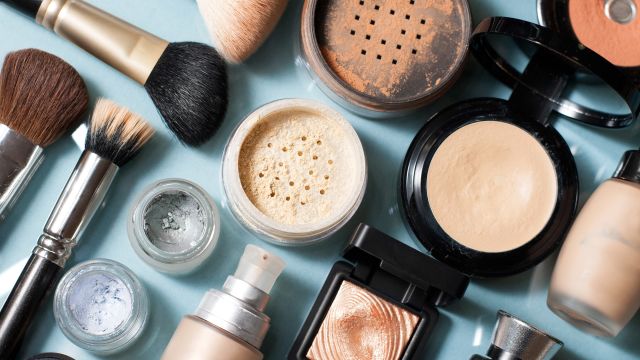Ahh the end of a long day; time to relax, kick off your shoes and… clean the layers of caked-on makeup off your face. What’s even in that stuff? Could it be secretly hurting your health?
We asked Gina Kirk, an expert esthetician specializing in dermatology at LewisGale Medical Center in Salem, Virginia, to discuss common cosmetic ingredients, and to weigh in on whether they could pose any long-term health risks.
Parabens
“Parabens are chemicals that help preserve cosmetics,” says Kirk. “They’re meant to keep you safe by preventing the growth of harmful bacteria and mold.”
Parabens are highly common, she continues. They can be found in makeups, moisturizers, shaving products and sunscreens, to name a few. They get absorbed through your skin, and they’re used so often studies estimate around 99 percent of people in the US have parabens in their system.
“The important thing is to use these products as directed and, as with all cosmetics, to read the label,” Kirk explains. Parabens may be listed under a variety of names, typically ending in ‘-paraben,’ such as:
- Methyl-paraben
- Propyl-paraben
- Butyl-paraben
- Ethyl-paraben
Have parabens been linked to cancer? There isn’t enough evidence to claim that these chemicals pose a threat to human health. The Food and Drug Administration (FDA) doesn’t regulate cosmetic preservatives before they hit the market, and manufacturers themselves usually perform safety testing. However, the FDA does review any studies published on preservatives. If researchers decide a substance is too risky, the FDA will notify the public. So far, parabens haven’t raised FDA concern.
The American Cancer Society (ACS) notes that parabens can have a weak estrogen-like effect. Estrogen is a hormone involved in female reproduction, and high levels of it might play a role in breast and ovarian cancer development.
In rodent studies, paraben exposure was linked to weight gain and ovary changes, among other effects. For male rats, it interfered with the production of sperm and male hormones. Additional lab studies suggest parabens could encourage weight gain, but there isn’t enough evidence to know whether they’d have a real effect on human weight.
Despite lab findings, studies haven’t shown a direct link between parabens and any health problems.
Formaldehyde
Formaldehyde is a preservative sometimes found in cosmetics, baby lotions and hair products. It’s a known cancer-causing agent, according to studies involving people who’ve had large exposures. The amount in US products is small enough to be considered safe, but it can cause allergic skin reactions on contact for some people.
Certain hair products like hair-smoothers may contain methylene glycol, which releases formaldehyde into the air when heated. Again, the FDA doesn’t approve hair and cosmetic products before they hit the market. But the organization does notify the public and issue warnings to companies if products could harm consumers. The FDA doesn’t limit formaldehyde use in cosmetics, but it has issued warnings about methylene glycol.
Since methylene glycol gets heated at the salon—during blow drying, curling, straightening, etc.—customers and salon workers may breathe in the formaldehyde it releases. That level of exposure puts them at risk for:
- Neurological problems like headaches and dizziness
- Vision problems
- Breathing difficulties or chest pain
- Nausea, vomiting
- Allergic reactions
Inhaled formaldehyde has also been associated with nose and lung cancer, according to the U.S. Occupational Safety and Health Administration (OSHA).
If you’re concerned about inhaling formaldehyde or methylene glycol at home, the FDA recommends checking product labels before making purchases. Also look for formalin, a similar compound, and watch out for these formaldehyde-releasing ingredients:
- DMDM hydantoin
- Imidazolidinyl urea
- Diazolidinyl urea
- Quaternium-15
- Bronopol (2-bromo-2-nitropropane-1,3-diol )
- 5-Bromo-5-nitro-1,3-dioxane
- Hydroxymethylglycinate
To avoid an exposure at the hairdresser, ask them to skip hair-smoothers. You can call ahead to confirm products are formaldehyde-free as well.
Talc
“Talc is a mineral that we’ve used for years,” says Kirk. It can be found in baby powders, dry shampoos, foundations and makeup powders. Because it absorbs moisture, it’s often used in products for oily skin and hair types.
“In its natural form, some talc powders contain asbestos,” says Kirk. “Asbestos is a known carcinogen, or cancer-causing substance. If talc that contains asbestos is put directly onto the genital area, or onto a sanitary napkin, it could potentially raise your risk of ovarian cancer.”
However, the FDA doesn’t allow cosmetic talc to contain asbestos. From 2009 to 2010, the organization commissioned a study to determine whether the substance had been successfully removed from US cosmetics. Out of the thirty-four products surveyed, the researchers found no asbestos fibers.
“Despite these results, the FDA is not saying that all talc-containing products are asbestos-free,” cautions Kirk. Only four out of the nine US talc suppliers were represented in the study, so not every product was tested.
A number of researchers have investigated whether talc products pose a risk even after asbestos removal. Some studies suggest there could still be a link between ovarian cancer and talc, but results are mixed. If you’re concerned, the ACS recommends limiting your use of talc-based products until more information is available.






